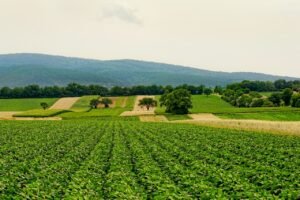
If you have ever grown your own fruits, vegetables, or herbs in a city environment, you may be familiar with the concept of urban farming. As cities continue to grow, so does the interest in sustainable and locally sourced food. However, navigating the complex web of urban farming laws can be a daunting task. In this article, we will explore the ins and outs of urban farming laws, shedding light on the regulations and guidelines that govern this increasingly popular practice. Whether you are a seasoned urban farmer or just getting started, understanding these laws is essential to ensure your efforts are in compliance with local regulations and can thrive in the urban landscape.

The Definition of Urban Farming
What is urban farming?
Urban farming refers to the practice of growing and cultivating food within urban areas, such as cities, towns, and suburbs. It involves utilizing available spaces, such as rooftops, balconies, community gardens, vacant lots, or even indoor environments, to grow a wide range of crops, including vegetables, herbs, fruits, and even livestock. It aims to bring fresh, locally-grown produce to urban communities and promote self-sufficiency, sustainability, and food security.
The benefits of urban farming
Urban farming offers numerous benefits both for individuals and communities. Firstly, it provides access to fresh, nutritious, and locally-grown produce, reducing the dependence on industrial farming and long-distance food transportation. This not only improves the quality and taste of the food but also promotes a healthier lifestyle and diet.
Furthermore, urban farming has positive impacts on the environment. By utilizing vacant lots or repurposing underutilized spaces, it helps reduce the urban heat island effect, improves air quality, and increases green spaces in cities. It also contributes to carbon sequestration and reduces greenhouse gas emissions associated with long-distance food transportation.
In addition, urban farming fosters community engagement and social cohesion. Community gardens and urban farms often become spaces for neighbors to interact, share knowledge, and build relationships. They can also provide educational opportunities for children and adults, teaching important skills related to gardening, sustainability, and healthy eating.
The growth of urban farming
In recent years, there has been a significant growth in urban farming initiatives around the world. Increasing concerns about food security, environmental sustainability, and the desire for healthier food options have fueled the expansion of urban farming. With advancements in technology and innovative farming techniques, it has become easier and more accessible for individuals and communities to engage in urban farming practices.
Governments, organizations, and individuals have recognized the potential of urban farming to address various pressing issues, such as food deserts in urban areas, limited access to fresh produce, and the need for sustainable food production. As a result, there has been an increase in the development of policies, regulations, and support systems to facilitate and regulate urban farming activities.
Importance of Understanding Urban Farming Laws
Ensuring compliance and avoiding legal issues
Understanding urban farming laws is crucial for individuals and communities engaged in urban farming. In order to operate within the legal framework, it is important to be aware of the zoning regulations, permits, licenses, health and safety requirements, and other legal considerations specific to urban farming.
By familiarizing yourself with these laws, you can avoid potential legal issues, such as fines, penalties, or even the shutdown of your farm. Non-compliance with urban farming laws can result in violations related to land use, noise or odor complaints, public health concerns, and environmental hazards. Therefore, taking the time to research and understand the applicable laws will help you ensure compliance and operate your urban farm smoothly.
Protecting the rights of urban farmers
Understanding urban farming laws also plays a vital role in protecting the rights of urban farmers. As urban farming gains popularity, there is a need to advocate for the rights of individuals and communities engaged in this practice. By understanding the legal landscape, urban farmers can actively participate in discussions and decision-making processes that affect their operations and livelihoods.
It is important for urban farmers to be aware of their rights to access and use land, water resources, and to have their produce marketed and sold to consumers. Being knowledgeable about these rights can empower urban farmers to engage with local governments, policymakers, and organizations to make informed decisions and influence the development of urban farming laws that are fair, supportive, and conducive to the growth of urban farming.
Promoting sustainable and safe practices
Urban farming laws also play a crucial role in promoting sustainable and safe practices within urban farming operations. These laws often include regulations and guidelines related to waste management, pesticide use, water conservation, and other environmental considerations.
Understanding and complying with these laws helps urban farmers minimize their environmental impact and contribute to the overall sustainability of their communities. By following best practices, urban farmers can reduce the use of harmful chemicals, conserve water resources, and manage waste effectively, ensuring that their farming activities are not only economically viable but also environmentally responsible.

Different Approaches to Urban Farming Laws
Zoning regulations
Zoning regulations are a key aspect of urban farming laws. These regulations determine where and how urban farming activities can take place within a city or municipality. They define which areas are designated for agricultural use and what types of activities are permitted in each zone.
By understanding the zoning regulations, urban farmers can identify suitable locations for their farms and ensure that their activities align with the designated land use. This involves considering factors such as the size of the plot, proximity to residential areas, noise limitations, and any other relevant zoning requirements.
Permits and licenses
Obtaining the necessary permits and licenses is another important aspect of urban farming laws. Depending on the jurisdiction, urban farmers may be required to acquire specific permits or licenses to operate their farms legally.
These permits and licenses may include agricultural permits, business licenses, or food handling certifications. They ensure that urban farmers meet certain standards and comply with health and safety requirements. By understanding and obtaining the required permits and licenses, urban farmers can demonstrate their commitment to operating legally and responsibly.
Health and safety requirements
Urban farming laws often include health and safety requirements to protect both the farmers and the consumers. These requirements may cover topics such as food handling practices, sanitation, pest control, and livestock management.
Understanding and implementing these requirements is essential to ensure that the food produced is safe for consumption and prevent the spread of diseases. Urban farmers should familiarize themselves with the local health and safety regulations applicable to their specific farming activities and implement appropriate measures to mitigate any potential risks.
Environmental considerations
Urban farming laws also address various environmental considerations to minimize the impact of farming activities on the surrounding environment. These considerations may include regulations related to water usage, runoff and erosion control, soil conservation, and protection of natural resources.
Urban farmers should be aware of these regulations and implement sustainable farming practices that minimize water consumption, prevent soil erosion, and promote biodiversity. By adhering to these environmental considerations, urban farmers can contribute to the overall ecological health of their communities.
Land use restrictions
Land use restrictions are another important aspect of urban farming laws. These restrictions define how urban farmers can use and develop their land for agricultural purposes. They may include limitations on the types of crops that can be grown, the size of the farm, the use of certain farming tools or equipment, and other relevant restrictions.
Understanding and complying with these land use restrictions is essential to ensure that urban farming activities do not infringe upon the rights of neighboring properties or conflict with the overall urban planning objectives of the city or municipality.
Common Challenges and Issues
Conflicts with existing land use
One common challenge faced by urban farmers is conflicts with existing land use. As urban areas become more developed, finding suitable land for farming becomes increasingly difficult. Urban farmers may face opposition from neighbors or existing businesses that view agriculture as incompatible with their surroundings.
To address these conflicts, urban farming laws should consider the need to balance agricultural activities with other land uses. This may involve zoning designations that allow for mixed land use or the establishment of buffer zones between farms and neighboring properties.
Noise and odor concerns
Noise and odor concerns are often raised by individuals living near urban farming operations. Agricultural activities such as animal husbandry or composting can emit odors and generate noise that may be perceived as a nuisance by nearby residents.
To address these concerns, urban farming laws may include provisions that require farms to implement odor control measures or place limitations on noise levels during specific hours. By understanding and complying with these regulations, urban farmers can mitigate the impact of their operations on the surrounding community.
Water usage regulations
Water usage is a critical issue in urban farming, especially in areas with limited water resources or during periods of drought. Urban farming laws may include regulations and guidelines on water conservation practices, irrigation systems, and rainwater harvesting.
Urban farmers should be aware of these regulations and implement water-efficient practices, such as drip irrigation or using graywater for irrigation, to minimize water consumption and ensure the sustainable use of this valuable resource.
Waste management
Effective waste management is another challenge faced by urban farmers. Agricultural activities can generate organic waste, such as crop residues or animal manure, which need to be managed properly to prevent environmental contamination or health hazards.
Urban farming laws may include regulations and guidelines on composting, waste disposal, or recycling practices. Urban farmers should familiarize themselves with these regulations and implement appropriate waste management strategies to minimize their environmental impact.
Ownership and property rights
Ownership and property rights can also pose challenges for urban farmers. In certain cases, land tenure may be uncertain, impeding the long-term viability of urban farming initiatives.
Urban farming laws should address issues related to land tenure and property rights, providing clarity and security for urban farmers. This may involve defining the rights and obligations of landowners and urban farmers, establishing long-term leasing options, or providing incentives for landowners to support urban farming on their properties.

Case Studies: Urban Farming Laws in Different Cities
New York City
New York City has been at the forefront of urban farming initiatives. The city’s Department of Health and Mental Hygiene regulates urban farming activities through the Article 81 of the New York City Health Code. It covers issues such as food safety, animal control, pest management, and composting. The city has also implemented zoning changes to promote the creation of urban farms and green roofs.
Chicago
Chicago has implemented various policies and regulations to support urban farming. The city’s Department of Buildings oversees the zoning regulations related to urban agriculture, allowing for the cultivation of crops and raising of livestock in designated areas. Chicago also offers grants and incentives to support urban farming projects, as well as educational programs and resources for aspiring urban farmers.
Portland
Portland, Oregon has established comprehensive urban farming regulations through its Zoning Code. The code allows for a wide range of farming activities in the city, including community gardens, market gardens, and small-scale livestock keeping. It also includes requirements for setbacks, fencing, composting, and other considerations to minimize potential impacts on neighboring properties.
Detroit
Detroit has embraced urban farming as a means of revitalization. The city’s zoning code was amended to include specific regulations for urban agriculture, allowing for urban farms, community gardens, and even commercial nurseries. Detroit has also developed programs and initiatives to address land access issues, including land banking and urban agriculture leasing programs.
San Francisco
San Francisco has implemented various policies and regulations to support urban farming and promote sustainable food production. The city’s Planning Code includes provisions for urban agriculture, allowing for community gardens and urban farms. San Francisco also offers financial incentives and educational resources to encourage urban farming and sustainability practices.
Legal Support and Resources for Urban Farmers
Local government agencies
Local government agencies play a critical role in providing legal support and resources for urban farmers. These agencies often have specialized departments or offices dedicated to agriculture, zoning, or environmental regulation. Urban farmers can reach out to these agencies for guidance on compliance, permits, zoning regulations, and other legal considerations.
Non-profit organizations
Non-profit organizations focused on sustainable agriculture and food justice can also provide legal support and resources for urban farmers. These organizations often offer workshops, training programs, and technical assistance to help urban farmers navigate the legal landscape. They may also advocate for policy changes to support urban farming and provide networking opportunities for farmers to connect with like-minded individuals.
Legal clinics and pro bono services
Legal clinics and pro bono services can provide free or low-cost legal advice and representation for urban farmers. These clinics may specialize in agricultural law or have experience in assisting small-scale farmers with legal issues. Urban farmers can seek assistance from these clinics to address specific legal concerns, such as permits, contracts, or land access.
Online resources and guides
Numerous online resources and guides are available to help urban farmers understand the legal requirements and navigate the legal landscape. These resources may include websites, forums, or publications that provide information on zoning regulations, permits, licensing, and other legal considerations specific to urban farming. Urban farmers can use these resources to educate themselves and find answers to their legal questions.
The Future of Urban Farming Laws
Trends and innovations
The future of urban farming laws is likely to be shaped by emerging trends and innovations in the field. As technology continues to advance, urban farmers may utilize tools such as vertical farming systems, aquaponics, or hydroponics to maximize productivity in limited spaces. These innovations may require adjustments to existing laws to accommodate new farming methods and practices.
Community involvement and activism
Community involvement and activism will play a crucial role in shaping the future of urban farming laws. As more individuals and communities recognize the value of urban farming, there will be increased demand for supportive policies and regulations. Community organizations, advocacy groups, and urban farming networks will continue to advocate for the rights of urban farmers and push for changes that promote sustainable and equitable urban farming practices.
Policy changes and advocacy
Policy changes and advocacy efforts will continue to influence urban farming laws. Governments at various levels may recognize the social, economic, and environmental benefits of urban farming and implement policies that support its growth. This could include incentives for landowners, tax breaks for urban farmers, or streamlined permit processes. Public-private partnerships and collaborations between government agencies and non-profit organizations will play an important role in driving these policy changes.
Impact of climate change and food security
The impact of climate change and the need for food security will shape the future of urban farming laws. As global temperatures rise and extreme weather events become more frequent, the importance of locally-grown food and resilient food systems will increase. Urban farming can contribute to food security by diversifying food production and reducing reliance on long-distance transportation. Laws and policies may be developed to incentivize urban farming as a means of adapting to climate change and ensuring a more sustainable food supply.
Conclusion
Understanding urban farming laws is vital for individuals and communities engaged in urban farming. It ensures compliance with regulations, protects the rights of urban farmers, and promotes sustainable and safe farming practices. By familiarizing themselves with zoning regulations, permits, license requirements, health and safety guidelines, and other legal considerations, urban farmers can operate their farms with confidence and contribute to the growth of resilient and sustainable food systems. With the support of government agencies, non-profit organizations, legal clinics, and online resources, urban farmers can navigate the legal landscape and continue to thrive in their mission to bring fresh, locally-grown food to urban communities. As the future of urban farming laws evolves, trends such as technological advancements, community activism, policy changes, and climate considerations will pave the way for a more sustainable and equitable urban farming sector.







